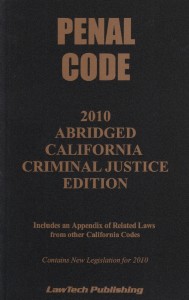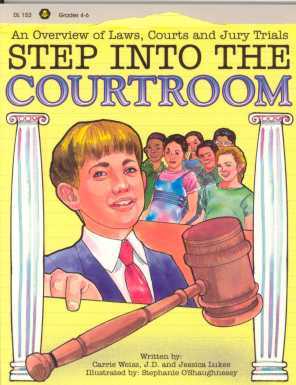In a previous post on courts and criminal trials, I talked about the procedures followed in a criminal trial in the United States. From the opening arguments, to the cross examination, to the summations and charging of the jury, and the final jury verdict, we’ve now learned the truth about how these trials really happen.
And I did promise to tell you the ten mistakes in my fictitious courtroom scenario.

So, here they are before we go any further, because a promise is a promise:
1. the defendant can’t be forced to testify under the 5th Amendment;
2. the Assistant Prosecutor is not allowed to scream at witnesses;
3. the doors at the back of the courtroom are guarded by officers and cannot just burst open;
4. any person testifying in court must identify themselves;
5.surprise witnesses are not allowed – each side, both the prosecution and defense, must exchange all information, which includes a list of all persons testifying;
6. the judge cannot order a person testifying off the witness stand;
7. the jury won’t come back with a verdict in only fifteen minutes;
8. a death penalty cannot be carried out two weeks after the verdict due to the appeals process;
9. no one is allowed to proceed to the witness stand if someone is already testifying;
10. fortunately, watching forensic and police procedural television shows 24 hours a day does not count as a type of execution under a death penalty . . . most likely because it would be considered cruel and unusual punishment.
Happy now?
Just like in any profession, there are certain terms, phrases and slang used that seems like a foreign language unless you are in that profession. In order for you to write accurately about a criminal trial, I have dedicated this post to these secretive terms. This is based on my over 32 years of experience as a Detective.
No true bill. Penal code. The stand. Mitigating circumstances. Acquittal. Bail. Indictment. Parole. Hung jury.

It might seem like it’s some sort of ancient Egyptian code.
Let’s demystify the key jargon used in criminal court proceedings.
Acquittal: where a defendant is found not guilty in a trial.
Aggravating Circumstances: used in a court to be considered by a jury in determining guilt. It is the basis as to what the defendant can be charged with.
Appeal: an application to a higher court to correct or modify the judgment of a lower court.
Assistant Prosecutor: an attorney who prosecutes criminal cases on behalf of the victim and the State. Also known as Assistant District Attorney in some states.
Bail: the amount of money or bond set by a judge to guarantee the accused’s reappearance in court on a later date.
Criminal Complaint: the official document signed by a law enforcement officer which outlines the charges against an accused. The charges noted will have the corresponding Penal Code citation of that state.
Defendant: the accused; once indicted by a Grand Jury, the accused is called the defendant.

Double Jeopardy: a person cannot be tried for the same crime twice in state court, once acquitted. This does not apply if a person has committed both a state and federal crime, such as bank robbery or assaulting a federal employee. In that case, since they are distinct jurisdictions, a person can be tried separately by the state and federal government.
Grand Jury: a twenty three person jury that hears evidence presented by the Assistant Prosecutor or Assistant District Attorney to determine whether or not there is probable cause for a formal charge, and whether to proceed to the trial phase. A Grand Jury hears testimony from all parties involved in each criminal matter, and each person testifies separately and in secret before the Grand Jury. There is no defense attorney or judge present. The Grand Jury does not need all members to vote; only a minimum quorum of seventeen is needed. Unlike a Petit Jury, the Grand Jury can ask questions of any person that testifies before it.
Indictment: a formal written charge by a Grand Jury that states a specific person committed a specific crime.
Jury: a Petit Jury consisting of either seven (one serves as an alternate juror) or fourteen (two serve as alternate jurors) citizens selected without prejudice to hear evidence relating to charges against a defendant. They cannot ask questions of anyone during the trial, nor can they take notes, photos or recordings to assist with their recollection of the testimony. When it is time for the jury to deliberate, the judge will excuse one juror in a seven person jury, or two jurors in a fourteen person jury.
Mitigating Circumstances: used primarily in a death penalty trial, these factors are what the defense presents to “mitigate” or explain why the defendant committed the actions of what he or she has been convicted of, and seeks to use these circumstances to have the jury vote on a lesser sentence than death. Some examples of defenses presented for mitigating circumstances would be prior sexual/physical abuse of the defendant, the poverty or cultural upbringing, family/mental health stressors, etc. In a death penalty trial, if the jury convicts the defendant, that same jury must now consider these mitigating factors as it decides on the issue of the death penalty.

Mr. Green: slang for money, oftentimes used by the defense attorney when referring to his or her client’s lack of funds to pay their legal expenses.
No True Bill: when the Grand Jury determines that the evidence presented before it was not sufficient and therefore does not indict the accused.
Parole: the release, under supervision of a parole officer and the Court, of a person sentenced to prison and has served part of the sentence.
Penal Code: defines what constitutes offenses in each state and fixes the penalties for these offenses.
Perjury: deliberate false testimony under oath.
Plea Negotiation: an agreement reached between the victim, the Assistant Prosecutor/Assistant District Attorney and the defendant where the defendant agrees to plead guilty to a charge or charges in return for a lesser sentence or other considerations.
Probation: where a person found guilty of a crime is allowed to remain free under supervision of a probation officer and the Court.
Sentence: the punishment imposed on a defendant by the judge in the trial, which may be incarceration, probation, restitution, community service, mental health and/or substance abuse counseling, fines, penalties, or any combination of these.
Stand: slang for the “witness stand”; where the person testifying in court is seated when testifying.

Subpoena: a written official summons for a person or entity to give appear in court, with a penalty of law for failure to appear.
Witness: a person called to testify regarding the case on trial; witnesses may be “fact” witnesses, where they testify as to what they saw, heard, smelled, etc. regarding the crime; they may be “alibi” witnesses where they were not present during the crime, but will testify that the defendant(s) was with them at the time of the crime and therefore not guilty as accused; or they may be “character” witnesses, who are not fact or alibi witnesses, as they will solely be testifying as to the defendant(s) character and reputation.
So there . . . we have cracked the Martian code.
Now, use these terms in your work as you develop your plot twists and turns.





